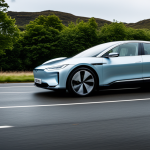Implementation of AI Technologies in UK Automotive Manufacturing
Artificial intelligence integration in automotive production is transforming UK car manufacturing by enhancing precision and productivity. UK automotive firms deploy various AI applications, such as robotics on assembly lines, which streamline complex tasks and improve consistency. Robotics handle repetitive or ergonomically challenging steps, reducing human error and speeding up production.
Machine vision is another cornerstone technology. It automates quality control by inspecting components with high accuracy, detecting micro-defects invisible to the human eye. This technology supports continuous improvement with real-time feedback, preventing faulty parts from advancing through the manufacturing process.
In parallel : The Future of Electric Vehicles: What Lies Ahead for the UK Automotive Industry?
Automation powered by AI further optimizes factory operations. From coordinating robot movements to managing workflow sequencing, automation systems increase throughput while maintaining flexibility. Integration of AI allows factories to adapt quickly to design changes or demand fluctuations without major downtime.
In summary, AI integration in automotive manufacturing in the UK leverages advanced robotics, machine vision, and automation to elevate efficiency and product quality. These technologies form the backbone of modern UK car manufacturing facilities, enabling competitive advantages in a demanding global market.
Also to discover : What Are the Most Common Challenges in the UK Automotive Industry Today?
Implementation of AI Technologies in UK Automotive Manufacturing
AI integration in automotive production within UK car manufacturing spans several advanced artificial intelligence applications. Central to this implementation is the deployment of robotics on assembly lines, where robots undertake precise, repetitive tasks with minimal error. This not only improves consistency but also allows human workers to focus on supervision and complex problem-solving, boosting overall productivity.
Machine vision systems play a pivotal role in quality assurance. These systems use AI-driven image recognition to inspect components rapidly and with extreme accuracy. By detecting defects invisible to the human eye, machine vision ensures that only compliant parts proceed through manufacturing, reducing waste and rework significantly. This form of automation tightly integrates with other AI-powered processes, providing continuous real-time feedback to optimize production quality.
Beyond robotics and machine vision, AI enhances factory automation by managing workflow sequencing and equipment coordination. These artificial intelligence applications enable flexible production lines, capable of adapting swiftly to design changes or demand shifts. The combination of robotics, machine vision, and automation exemplifies the cutting-edge AI integration in automotive manufacturing, firmly placing UK car manufacturing at the forefront of modern industrial innovation.
Implementation of AI Technologies in UK Automotive Manufacturing
The AI integration in automotive manufacturing within the UK prominently features robotics, machine vision, and automation systems—each critical to elevating productivity and precision. Robotics tackle assembly line tasks requiring high repeatability and accuracy, significantly reducing human error. These systems handle complex operations such as welding, painting, and component installation, which demand consistency beyond manual capabilities. Robots also improve safety by managing ergonomically challenging procedures.
Machine vision, powered by artificial intelligence applications, plays an indispensable role in quality control. These systems use AI algorithms to scan parts for defects, identifying microscopic flaws invisible to the naked eye. This rapid inspection process both enhances component compliance and reduces costly rework. AI-driven automation ties these inspections directly into production workflows, enabling immediate corrective actions.
Beyond this, factory-wide automation orchestrates equipment and workflow sequencing. AI integration in automotive facilities permits real-time adaptability to production shifts, such as design updates or varying order volumes. By intelligently coordinating machinery and human operators, these technologies optimize throughput while maintaining product standards. The synergy of robotics, machine vision, and automation demonstrates how UK car manufacturing advances through sophisticated artificial intelligence applications that ensure speed, precision, and flexibility.
Implementation of AI Technologies in UK Automotive Manufacturing
In UK car manufacturing, AI integration in automotive production primarily revolves around advanced robotics, machine vision, and automation systems. Robotics perform highly repetitive and precise manufacturing tasks, including welding and component assembly, ensuring consistent quality with minimal human intervention. This enhances both productivity and safety by reducing manual handling of hazardous or strenuous operations.
Machine vision systems apply artificial intelligence applications to inspect every component thoroughly. These AI-driven visual inspections detect even microscopic defects, surpassing traditional quality control methods. This continuous, high-speed inspection helps prevent faulty parts from progressing through manufacturing, thereby reducing waste and costly rework.
Automation powered by AI orchestrates the overall manufacturing workflow by coordinating machinery and sequencing production tasks. This level of automation enables rapid adaptability to design changes or fluctuating demand without disrupting operations. The integration of these artificial intelligence applications ensures that UK automotive manufacturing maintains efficiency, precision, and flexibility, reinforcing its competitive edge in a highly demanding global market.
Implementation of AI Technologies in UK Automotive Manufacturing
The UK automotive sector’s AI integration in automotive manufacturing prominently features robotics, machine vision, and automation to advance production capabilities. Robotics excel in executing precise, repetitive tasks on assembly lines—such as welding and component fitting—boosting output quality and reducing human error. These artificial intelligence applications free human operators from hazardous or monotonous activities, fostering efficiency and workplace safety.
Machine vision equipped with AI algorithms inspects vehicle parts at microscopic levels, identifying defects traditional methods may miss. This continuous and rapid quality control integration reduces waste by rejecting substandard components early. It also enables real-time feedback loops, allowing manufacturers to adjust processes swiftly.
Furthermore, AI-powered automation coordinates robotic actions and workflow sequencing in real time. This adaptability permits UK car manufacturing to efficiently handle design modifications and fluctuating orders without interrupting operations. The seamless interplay of these AI-driven systems ensures optimized throughput and consistent product standards, underpinning the UK’s competitive edge through advanced artificial intelligence applications in automotive production.









